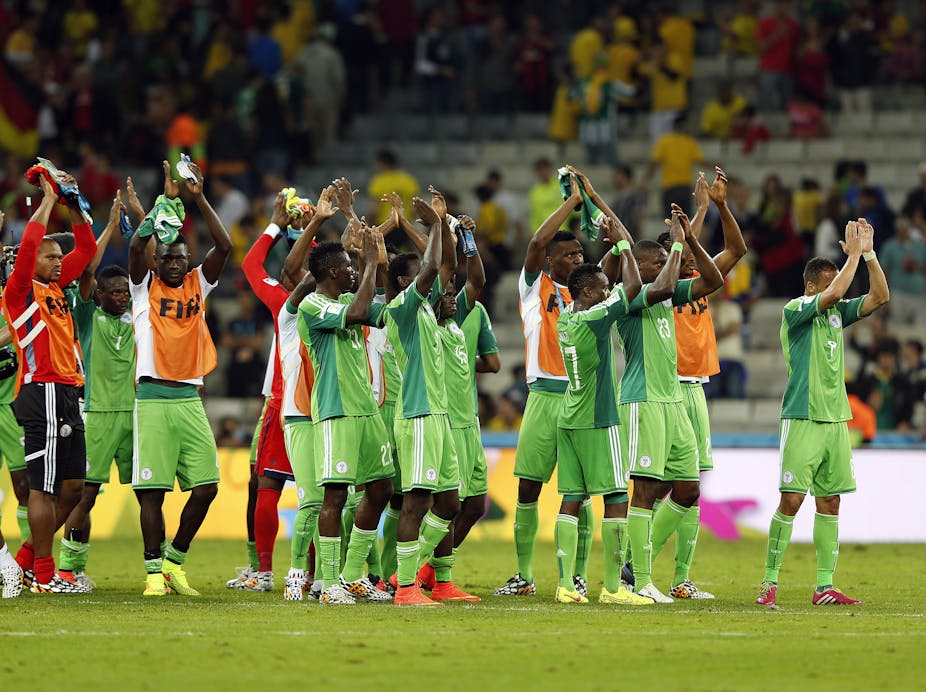Let’s be realistic. Australia is the lowest ranked of the 32 teams in the World Cup, and despite a very creditable performance in its first match against Chile, its chances of making it out of the group stage are slim.
Australia’s World Cup hopes may even be over after their second game on Thursday morning. When the knockout stage starts on June 28, Australian fans will probably need to find another team to cheer for. But what team should that be?
Jeremy Bentham, an 18th century British philosopher, thought that society should strive for “the greatest happiness of the greatest number”. This philosophical theory, which is known as utilitarianism, has had a powerful impact on economic and political thought for almost 250 years.
So let’s begin with “the greatest number”. If we look purely at population, then the largest of the 32 countries at the World Cup is the United States, followed by Brazil, Nigeria and Russia.
But it hardly seems plausible that global happiness will be best served by the US winning the World Cup. After all, the US is one of only three countries taking part where association football is not the most popular sport. The other two are Switzerland (ice hockey) and Australia (AFL), just in case you were wondering.
What about “the greatest happiness”? Dutch bank ING conducted a survey of 8,000 people in 15 of the countries represented in the World Cup.
ING asked, among other things, how much people would be willing to pay to see their country win the World Cup. This “willingness to pay for victory” was lowest in the United States, where those surveyed apparently would pay the equivalent of A$53 to see their team win, and highest in Argentina, Italy, and Chile. According to the survey, Chileans are willing to pay, on average, A$757 to see their team win.
The ING survey was obviously conducted for fun, and it is hard to take a number like that too seriously. But let’s play along, and look at what happens if we weight the population numbers by this willingness to pay.
By this measure – and again remembering the survey only looked at 15 countries – global happiness is best served by Italy winning the cup: 62 million people each willing to pay A$667 means victory would be worth more than A$40 billion to the Italians.
Next comes Russia, who would apparently be collectively willing to pay A$32 billion, followed by Brazil (A$29 billion).

Of course, people in richer countries can afford to pay more, so those dollar values aren’t likely to be a good basis for comparing happiness. The ING survey did look at these numbers relative to GDP, but they didn’t conduct the survey in most of the poorer countries which are competing.
However, a World Cup victory might mean considerably more to individuals who don’t enjoy much in the way of material wealth. The poorest country represented at the World Cup in terms of GDP per person (on a purchasing power parity basis) is Cameroon, followed by Côte d’Ivoire, Ghana, Honduras and Nigeria.
So, if you would like to see some of the poorest people in the world see their country emerge victorious, those are good candidates to support.
But, again, if we want a victory for the greatest number of truly poor people, then we also need to consider population. One approach is to look at which country has the most people living below the US$2-a-day poverty line.
In third place, by that measure, is Ghana: around half of its 26 million people fall below the threshold. Brazil is second: it has a population of just over 200 million, about 11% of whom fall below that poverty line as of 2009, for a total of about 22 million people. Victory for the host nation would certainly make a large number of the world’s poor very happy.
But the clear winner – though the term hardly seems appropriate – is Nigeria. As of 2010, almost 85% of its population of about 177 million live on less than US$2 per day. That’s about 150 million people, which is more than the combined total population of Côte d’Ivoire, Chile, Netherlands, Ecuador, Belgium, Greece, Portugal, Switzerland, Honduras, Croatia, Bosnia and Herzegovina, and Uruguay.
So, if you would like to see a large number of desperately poor people enjoy the real – if ephemeral – joy of a World Cup victory, the choice is clear: you should cheer for Nigeria.
And after Nigeria has been eliminated, you can, in good conscience, cheer for Brazil.

